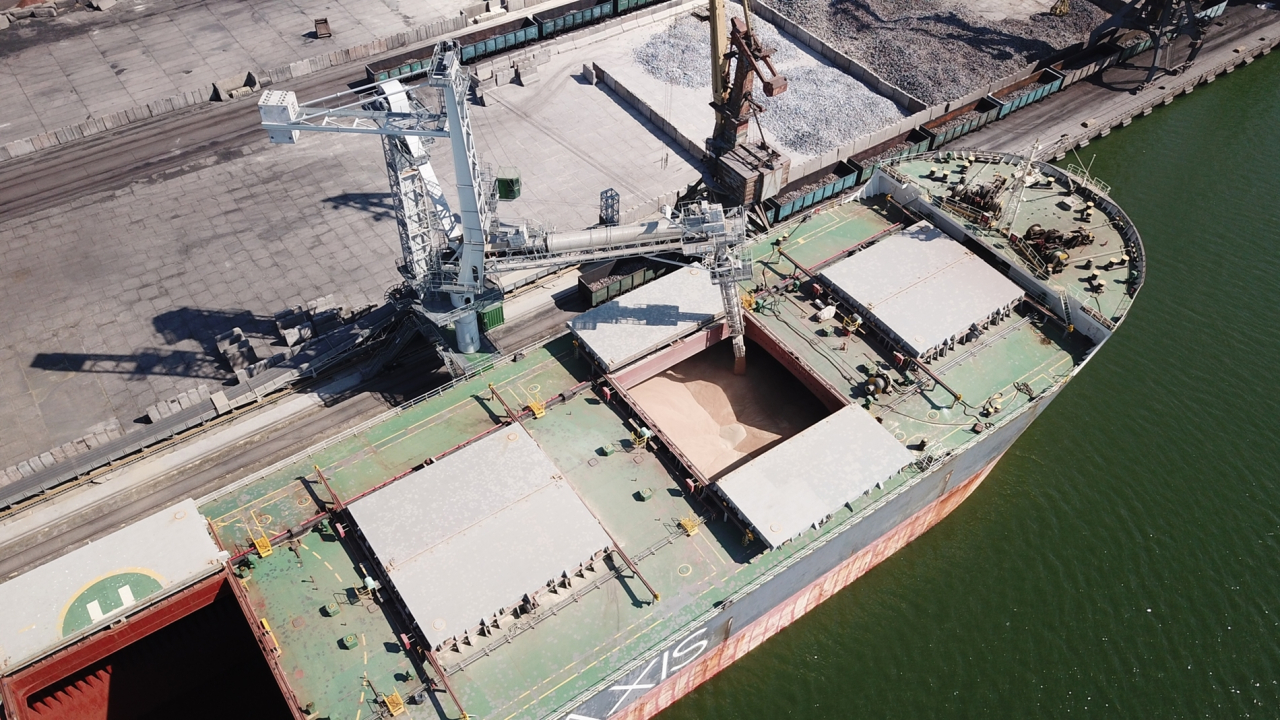 |
Posco International’s Ukrainian grain terminal (Posco International) |
Posco International said Thursday it imported 68,000 metric tons of feed wheat from Ukraine, for the first time in South Korea, a move to secure a stable grain supply system for the nation.
Of the total, 41,000 tons were imported through the Ukrainian grain terminal invested in by the trading company. The imports were made in partnership with Nonghyup Feed, the largest feed grain importer in Korea.
Posco International said this shipment was the first import of feed grain from a overseas grain export terminal that was invested in by a Korean company.
The company added that it was important to be able to secure fixed contracts in the feed market amid the pandemic, as key food exporters are concentrating on food stockpiling and major overseas grain companies dominate the market.
In 2019, Korea’s demand for wheat was 3.43 million tons, but domestic production was only around 20,000 tons, with the rest coming from imports. Of the total, 2.55 million tons was used for food and the rest was for animal fodder, although the latter portion can be replaced with corn and other grains when wheat prices are relatively high.
With the initial supply of feed wheat, the company said it plans to build a stable national grain procurement system using its own terminal.
In 2018, Chairman Choi Jeong-woo selected the initiative to foster the food business as one of the group’s top 100 reform projects.
Early last year, Posco International signed a deal with Orexim Group, a Ukrainian logistics company, to acquire a 75 percent stake in a grain export terminal in the Ukrainian Black Sea port of Nikolayev. The terminal was completed in September last year to enable the Korean trading company to control the production, inspection, storage and shipment of grain produced in Ukraine. The terminal is capable of shipping 2.5 million tons of grain annually.
The firm is strengthening its presence in the global market by selling grains such as corn and wheat to the European Union, the Middle East, North Africa and Asia, and is making Ukraine a key hub for grain trading.
Posco International’s food business has expanded into major grains such as wheat, corn, soybeans and barley, starting with rice. Accordingly, its trade volume has grown from 840,000 tons in 2015 to about 7.5 million tons in 2020.
“We will contribute to the government’s food security policy by establishing a system to stably procure foreign agricultural resources amid increased price volatility in the international grain market,” said Posco International CEO Joo Si-bo.
“Through this, we plan to participate in solving the social problems of the food crisis and put into practice the ‘Corporate Citizen’ management philosophy of Posco Group.”
Nonghyup Feed CEO Ahn Byeong-woo said, “The import of feed wheat through cooperation with Posco International is significant in that Nonghyup Feed has contributed to food security and enhanced the actual benefits of livestock farmers through the stable introduction of competitive raw materials.”
Posco International reported a quarterly net income of 55 billion won ($48.4 million), up 404.3 percent from a year earlier, according to the firm’s regulatory filing on Thursday.
Operating income in the third quarter was 107.1 billion won, down 34.4 percent from a year ago. Sales fell 14 percent to 5.06 trillion won. The operating profit was around 6 percent higher than market expectations.
By Shin Ji-hye (
shinjh@heraldcorp.com)








